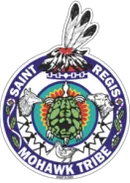Committee Explores Economic Development
On Thursday April 18, 2013, the Saint Regis Mohawk Tribe was ably represented by Sub-Chief Michael Conners at a meeting between New York State government officials and tribal officials. The purpose of the meeting was to explore and discuss economic development in the state and how tribes and state government can work together to promote economic development. Representatives from the Oneida, Seneca, Unkechaug, and Mohawk tribes met with Senators George Maziarz, Betty Little and other members of the Senate Committee on State-Native American Relations.
Conners presented information on the Mohawks’ gaming industry and how it creates strong tribal governments and prosperous communities. The Indian Gaming Regulatory Act opened up gaming for tribes to promote tribal economic development, self-sufficiency, and strong Tribal governments. “Gaming funds are limited to specifics areas,” Conners noted. “These are to fund tribal government operations and programs, to provide for the general welfare of tribal members, to promote tribal economic development, to donate to charitable organizations and to help fund operations of local governmental agencies. And that is how the Saint Regis Mohawk Tribe has been investing its gaming dollars.”
The gaming industry in Akwesasne continues to grow. Total employment in 2003 was 956 people and in 2012 it was 1,616. Forty-seven percent of its tribal and gaming employees are non-native employees with an average wage of $29,000. This represents a total of $22,000,000 in non-native wages, with $47,000,000 in wages paid St. Lawrence and Franklin counties. Over $5.6 million in medical benefits were paid directly within New York State in 2012.
In addition to payroll, the tribe provides complete funding to some programs, such as the Tribal Gaming Commission (regulating gaming in Akwesasne) and community support programs. These programs provide medical assistance and heating assistance. Community donations support local groups such as the Freedom School which is a 100 percent Mohawk language and culture school, the library and cultural museum, the Akwesasne Boys and Girls Club, the community volunteer fire department and the local ambulance unit.
Water and sewer plant operations are completely funded by the tribe as is the Home Improvement Program; a home repair program for seniors and low income families. Gaming proceeds also allow the tribe to provide supplemental funding to its health program, heating fuel assistance, law enforcement, some road repair, higher education, senior’s programs, social services and historic Mohawk cultural preservation.
“Additionally, Akwesasne’s private sector employs over 400,” said Conners. “Most are non-natives and, without the Akwesasne economy, may have been out of work.” The tribe regulates the local private sector through its Compliance Department which restricts sellers, monitors pricing and enforces fees on alcohol, fuel and tobacco. “Portions of these fees are restricted to fund necessary programs like our chronic care program, an alcohol/substance abuse rehabilitation facility, an alcohol/chemical dependency program, tribal court and tribal police,” he added. “More and more tax-paying non-natives voters are relying on Akwesasne to support themselves.”
“Consumers retain more disposable income to spend in other businesses rather than on New York State taxes. This helps local and regional economies,” Conners explained. A 2008 report showed an estimated $95 million Gross Regional Product to St. Lawrence and Franklin Counties attributed to Akwesasne’s economy. This included $3.8 million in local/state taxes. The report further showed an estimated $120 million Gross State Product attributed to Akwesasne including $5.8 million in local/state taxes. Conners emphasized, “The sovereign Saint Regis Mohawk Tribe has restarted the economic engine of the North Country. We bring substantial employment, employee benefits, and economic benefits to northern New York and New York State.”
For more information contact the Public Information Office at 518-358-2272.

